Related Research Articles

Niue is a self-governing island country in free association with New Zealand. It is situated in the South Pacific Ocean and is part of Polynesia, and predominantly inhabited by Polynesians. The island is commonly referred to as "The Rock", which comes from the traditional name "Rock of Polynesia".

The politics of Niue take place in a framework of a parliamentary representative democratic dependency, whereby the Chief Minister is the head of government, and of a non-partisan system. Niue is self-governing in free association with New Zealand and is fully responsible for internal affairs. New Zealand retains some responsibility for external affairs, in consultation with Niue. The Niue Constitution Act 1974 (NZ) vests executive authority in His Majesty the King in Right of New Zealand and the Governor-General of New Zealand. The constitution specifies that in everyday practice, it is exercised by a Cabinet of the Premier of Niue and three other ministers. The premier and ministers must be members of the Niue Assembly, the nation's legislative assembly. The Judiciary is independent of the executive and the legislature.

.nu is the Internet country code top-level domain (ccTLD) assigned to the island state of Niue. It was one of the first ccTLDs to be marketed to the Internet at large as an alternative to the gTLDs .com, .net, and .org. Playing on the phonetic similarity between nu and new in English, and the fact that nu means "now" in several northern European languages, it was promoted as a new TLD with an abundance of good domain names available. The .nu domain is now controlled by the Internet Foundation in Sweden amid opposition from the government of Niue.
Time in New Zealand is divided by law into two standard time zones. The main islands use New Zealand Standard Time (NZST), 12 hours in advance of Coordinated Universal Time (UTC) / military M (Mike), while the outlying Chatham Islands use Chatham Standard Time (CHAST), 12 hours 45 minutes in advance of UTC / military M^ (Mike-Three).

Alofi is the capital of the island nation of Niue. With a population of 597 in 2017, Alofi has the distinction of being the second-smallest capital city of a sovereign state by population. It consists of two villages: Alofi North and Alofi South. They collectively serve as the capital, but of the two, Alofi South hosts more government buildings, as many were moved to the southern part after Cyclone Heta.

The Realm of New Zealand is the area over which the monarch of New Zealand is head of state. The realm is not a federation but is a collection of states and territories united under its monarch. New Zealand is an independent and sovereign state that has one territorial claim in Antarctica, one dependent territory (Tokelau), and two associated states. The Realm of New Zealand encompasses the three autonomous jurisdictions of New Zealand, the Cook Islands, and Niue.

Neiafu is the second-largest town in Tonga with a population of 3,845 in 2021. It is situated beside the Port of Refuge, a deep-water harbour on the south coast of Vavaʻu, the main island of the Vavaʻu archipelago in northern Tonga. To the north-west lies the 131-metre high (430 ft) Mt. Talau with its distinctive flat top.

The Seal of Niue, or the Public Seal of Niue, is the official seal of Niue. It was adopted in September 2021. The first version of the seal was created in 1974 when Niue gained self-governing status and joined into free association with New Zealand.
Niue maintains diplomatic relations with various other countries and multilateral organizations.

General elections were held in Niue on 7 June, 2008. They were initially expected to be held in April, but were delayed until June 2008. Niue has a 20-member legislative assembly, called the Niue Assembly, whose members are elected by approximately 600 registered voters. The assembly consists of 20 total members, 6 elected on a common roll and 14 representatives of the villages

Avatele, formerly known as Oneonepata Matavaihala, is one of the fourteen villages of Niue, located on the southwest coast, with a population of 143 residents as of 2017.
Terry Magaoa Chapman was a Niuean administrator known for his work in advocating the self-governance of Niue.

New Zealand heraldry is the term for the style of armorial achievements, sometimes known as coats of arms, and other heraldic bearings and insignia used in New Zealand. It largely follows the Gallo-British tradition of heraldry also followed in England, Scotland, Ireland, Canada and Australia.

The political status of the Cook Islands and Niue is formally defined as being states in free association within the Realm of New Zealand, which is made up of the Cook Islands, Niue, and New Zealand and its territories, Tokelau and the Ross Dependency. The Cook Islands and Niue do not have full constitutional independence from New Zealand but act as independent countries. Some countries have recognised them as sovereign entities and established diplomatic relations. However, New Zealand may carry out defence and foreign affairs on behalf of the two associated states when requested.

India–Niue relations are the bilateral relations between India and Niue.
Huanaki Cultural Centre & Museum was a national museum and cultural centre in Alofi in Niue, which was destroyed in 2004 by Cyclone Heta.

Tāoga Niue Museum is a national museum and cultural centre located in Alofi, Niue. It replaced the Huanaki Cultural Centre & Museum, which was destroyed by Cyclone Heta in 2004.
Moira Zeta Enetama is a Niuean curator and cultural activist, who, as of 2021, was acting director of the Ministry of Social Services in Niue. She is also the Director of Tāoga Niue Museum. She is a former director of Taoga Niue, the governmental department that oversees cultural activities and preservation. During her directorship of Taoga Niue, Cyclone Heta destroyed Huanaki Cultural Centre & Museum, a disaster that Enetama described as "devastating". She has been outspoken on the benefit television can bring to ensure survival of the Niuean language.
References
- ↑ Xiong, Ping (2007). "Traditional Knowledge and Intellectual Property Protection - the Endeavour of Niue". Rochester, NY.